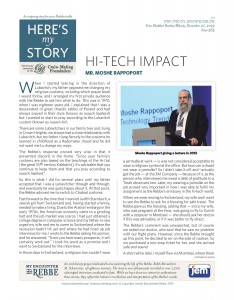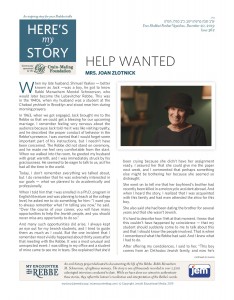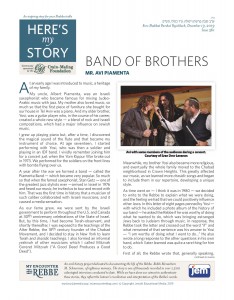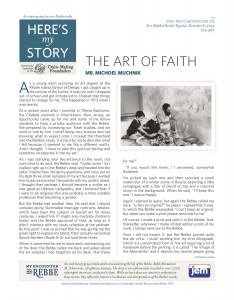Hi-Tech Impact
When I started leaning in the direction of Lubavitch, my father opposed me changing my religious customs, including which prayer book I would follow, and I arranged my first private audience with the Rebbe to ask him what to do. This was in 1970, when I was eighteen years old. I explained that I was a descendent of great chasidic rabbis of Poland and had always prayed in their style (known as nusach Sephard) but I wanted to start to pray according to the Lubavitch custom (known as nusach Ari).
There are some Lubavitchers in our family tree and, living in Crown Heights, we always had a close relationship with Lubavitch, but my father clung fiercely to the customs he learned in childhood as a Radomsker chasid and he did not want me to change my ways.
The Rebbe’s response proved very wise in that it prevented discord in the home: “Since your family’s customs are also based on the teachings of the Ari’zal [the great 16th century Kabbalist], it’s advisable that you continue to keep them and that you pray according to nusach Sephard.”
So this is what I did for several years until my father accepted that I was a Lubavitcher through and through, and eventually he was quite happy about it. At that point, the Rebbe advised me to switch to Chabad customs.
Fast forward to the time that I married Judith Sternbuch, a Jewish girl from Switzerland and, having started a family, needed to make a living. Due to the Arab oil embargo in the early 1970s, the American economy came to a grinding halt and the job market was scarce. I had just obtained a college degree in computer science and my father-in-law urged my wife and me to come to Switzerland where the recession hadn’t hit yet and where he had lined up job interviews for me. I wrote to the Rebbe asking his opinion, and he answered, “Since you have many prospects, it will certainly work out.” I took his word as a promise and I went to Switzerland for the interviews.
In those days in Switzerland, a religious Jew couldn’t wear a yarmulke at work – is was not considered acceptable to wear a religious symbol at the office. But how can a chasid not wear a yarmulke? So I didn’t take it off, and I actually got the job – at the 3M Company – because of it, as the person who interviewed me owed a debt of gratitude to a Torah observant Jew. Later, my wearing a yarmulke on the job proved very important in how I was able to fulfill my assignment as the Rebbe’s emissary in the hi-tech world. (more…)








